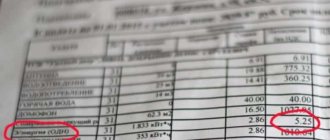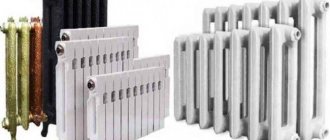There is an opinion that in apartment buildings with a vertical heating system it is impossible to keep track of individual heat energy consumption. This is wrong. We understand the technical feasibility of installing heat metering systems in apartment buildings together with.
Is it necessary to verify IPU and public meters in 2021?
What formulas are used when calculating heating fees?
Clause 42(1) of the Rules for the Provision of Utility Services describes in what cases (in the presence (absence) of a general public utility and (or) IPU) and by what formula the payment for utility services is calculated.
According to this standard, payment for heating utilities in apartment buildings is carried out in one of two ways: during the heating period or evenly throughout the calendar year. If there is no operating budget in the house, the amount of payment for the heating utility service is determined by formulas 2 and 2(1) from Appendix 2 to the Rules for the Provision of Utility Services based on the consumption standard for the heating utility service. If the apartment building is equipped with a fire control unit, but not all residential or non-residential premises have installed heat control units, the amount of payment for utility services for heating in the premises is determined using formulas 3(1) and 3(2) from Appendix 2 based on the average monthly volume of heat energy consumption for heating for the previous year, determined according to the readings of the operational control unit. If the apartment building is equipped with a fire control unit and all residential and non-residential premises have IPU installed, the amount of payment for utility services for heating in the room is determined using formulas 3(3) and 3(4) from Appendix 2 based on the readings of such meters. In a new apartment building that has been put into operation, equipped with a public utility system, all premises are equipped with a public utility system, therefore, formula 3(3) should be applied and the amount of payment should be adjusted once a year according to formula 3(4), if the executive authorities of the relevant constituent entity of the Russian Federation have established a method of payment for utility services for heating during the calendar year.
How to calculate the fee if the IPU readings are missing?
Let us remind you that, according to clause 36 of the Rules for the provision of public utility services, the management company is obliged to make calculations only in accordance with these rules. In other words, if all premises in an apartment building are equipped with heat insulation control units, the calculation should still be carried out using formulas 3(3) and 3(4), even if not all consumers transmit meter readings. At the same time, by virtue of paragraphs. “z” of clause 31 of the rules, the contractor is obliged to notify consumers at least once a quarter by indicating in payment documents: – about the timing and procedure for taking IPU readings by consumers and transferring the relevant information to the contractor or his authorized person; – on the application in case of failure by consumers to provide information on meter readings of the information specified in clause 59 of the Rules for the provision of utility services. According to this paragraph, the payment for utility services for heating (when, in accordance with paragraph 42(1) of the rules, the IPU readings are used to determine the amount of the payment) is determined based on the average monthly (for the heating period) volume of consumption in the following cases: a) in case of failure or the loss of a previously put into operation IPU or in the event of expiration of its service life from the date when the specified events occurred until the date when the accounting of the utility resource according to the IPU was resumed; b) if the consumer fails to provide IPU readings starting from the billing period for which the meter readings were not submitted, until the billing period (inclusive) for which the consumer provided the IPU readings to the contractor; c) in the event of a consumer’s refusal to gain access to the IPU (see paragraph “d”, clause 85 of the Rules for the Provision of Public Utilities) and the contractor draws up a corresponding act starting from the date when the contractor drew up the act of refusal of admission to the IPU until the date of the checks. In all of the above cases, the calculation is made for such a consumer based on the average monthly volume, but not more than three billing periods in a row. How to determine the fee after the specified three months?
What to do if it is impossible to repair the ODPU
Elena Shereshovets noted that ODPU cannot always be repaired. If the device cannot be repaired, the management organization must draw up an act stating that it is impossible to restore the ODPU, then hold a general meeting of owners, the agenda of which includes the issue of replacing the device. The owners will agree to install a meter at their own expense or will decide not to install a new ODPU.
If a common house meter is installed at the expense of the owners, the management organization needs to organize the installation process and issue invoices to the owners. If the owners refused to pay for the installation of a new DPSU, the legislation does not provide for the obligation for management organizations, HOAs, residential complexes, housing cooperatives to install common house metering devices.
But not everything is as simple as it seems. Courts do not always take the position that the MA is responsible only for the operation and repair of the ODPU, and should not replace them. Examples of decisions in which the court indicated that the management authority must carry out not only repairs, but also replacement of common house metering devices:
1. JSC Murmansk Regional Court dated 09/03/2014 No. 33-2548.
The court considered the claim of the city administration against the management organization with a demand to install ODPU and came to the conclusion that management organizations have a responsibility for proper maintenance, including installation, repair and replacement of metering devices in an apartment building and maintaining them in a state of constant readiness for deliveries communal resources.
2. JSC of the Supreme Court of the Republic of Karelia dated October 23, 2012 in case No. 33-3130/2012.
In this case, one of the owners of premises in an apartment building demanded that the management organization replace a failed common building meter. The court decided that the plaintiff’s demands were justified and management organizations were assigned the obligation to install, repair and replace meters in apartment buildings, maintaining them in a state of constant readiness for the supply of utility resources.
3. Decision No. 2-1746/2015 of the Pervomaisky District Court of the city of Murmansk dated 04/11/2015.
The city administration filed a lawsuit against the management organization. In the apartment building there was a common house heat meter, which the management office dismantled, and charged the owners according to the standards. The owners were unhappy with this situation and contacted the administration with a complaint.
The court indicated that the management organization must maintain the common property of the apartment building in proper condition. And the building's thermal energy metering devices are included in the UI.
The court ordered the UO to install the heat ODPU in accordance with paragraphs. “k” clause 11 of the Government of the Russian Federation of August 13, 2006 No. 491, which determines that the maintenance of the common property of an apartment building includes ensuring the installation and commissioning of common building meters for cold and hot water, thermal and electrical energy, natural gas, as well as their proper operation.
Ministry of Construction of the Russian Federation about metering devices in dilapidated and emergency facilities
77520
The testimony of the IPU has not been transferred: three months have passed.
According to paragraphs. “b” clause 82 of the Rules for the Provision of Public Utilities, the contractor is obliged to check the accuracy of the information provided by consumers about the readings of IPUs and distributors by checking them with the readings of the corresponding meter at the time of the check (in the case when the readings of such meters and distributors are taken by consumers). These checks must be carried out by the contractor at least once a year, and if the metering devices being checked are located in the consumer’s residential premises, then no more than once every three months. As follows from clause 84 of the Rules for the Provision of Utility Services, if the consumer fails to provide the contractor with IPU testimony for six months in a row, the contractor no later than 15 days from the date of expiration of the specified six-month period, another period established by the agreement containing provisions for the provision of utility services, and (or ) by decisions of the general meeting of owners of premises in the apartment building, is obliged to conduct an inspection and take meter readings. This means that if the consumer fails to provide monthly IPU readings within six months, the executor not only has the right, but is also obliged to check the consumer’s IPU readings. However, there is some inconsistency in this norm, since based on the average monthly volume, in case of failure to provide IPU readings, only three billing periods in a row can be calculated [1], and the contractor is obliged to check the IPU readings only after six months. A completely fair question arises: how to make payments in the fourth, fifth and sixth billing periods? In such a situation, we consider it necessary for the management company not to wait for six months and to check the IPU after three months, since the contractor has this right according to clause 82 of the Rules for the provision of utility services . The procedure for conducting such a check is set out in paragraph 84 of the rules. According to clause 85(3) of this document, in the event of drawing up the act provided for in clause 85 of these rules on refusal of access to the metering device after three billing periods from the date of drawing up such an act, the executor has the right to calculate the payment for utilities based on the utility consumption standard taking into account the number of persons permanently and temporarily residing in the residential premises, as well as taking into account the increasing coefficient starting from the 1st day of the month in which such an act was drawn up. The value of the increasing coefficient is assumed to be 1.5. It would seem that everything is simple. If the consumer has not provided the IPU readings: - for the first three months, the management company calculates the fee based on the average monthly volume of consumption (according to the IPU data for past periods); - then it conducts a check and, if an act of refusal of access to the meter is drawn up, after three months it calculates payment according to consumption standards with an increasing factor ( Pi = Six NT x 1.5 x TT ). This procedure should encourage the consumer to provide evidence of the IPU.
However, clause 85(3) of the Rules for the provision of public utility services came into force only on 01/01/2017, and we see that the legislator did not think through the possibility of its application, since he did not make changes to formula 3(3) from Appendix 2 to the rules. Let's present it for clarity.
Vin – volume (quantity) of thermal energy consumed during the billing period in the i-th residential or non-residential premises in an apartment building, determined when paying for utility heating services during the heating period according to the readings of the IPU in the i-th residential or non-residential premises, and when paying evenly throughout the calendar year - based on the average monthly volume of thermal energy consumption for heating in the i-th residential or non-residential premises according to the IPU readings for the previous year;
Viodn – volume (quantity) of thermal energy provided during the billing period in an apartment building equipped with a thermal energy control unit, with the exception of the volume (quantity) of thermal energy consumed in all residential or non-residential premises in an apartment building, which is determined by the formula:
Vd – volume (quantity) of thermal energy consumed during the billing period in the apartment building, determined when paying for utility services for heating during the heating season according to the indications of the operating budget, and when paying evenly throughout the calendar year - based on the average monthly volume of thermal energy consumption for heating in MKD according to the testimony of the OPU for the previous year;
Si – total area of the i-th premises (residential or non-residential) in the apartment building;
Sob – total area of all residential and non-residential premises in the apartment building;
TT – tariff for thermal energy, established in accordance with the legislation of the Russian Federation.
It turns out that when the contractor uses the consumption standard to calculate the heating fee for an unscrupulous consumer who does not submit IPU readings for three billing periods in a row, the contractor will receive less payment for heating in terms of the volume on the ODN. The fact is that the heating utility standard ( NT ) includes the consumption of thermal energy not only in the room, but also in the central heating unit. It turns out that in the conditions of application of the standard when calculating fees for consumers who do not give IPU readings, when calculating fees for consumers who provide meter readings, according to formula 3(3), the indicator Viodn is already reduced by the volume of consumption per UDN contained in the standard for the consumer, who did not give evidence.
This means that in formula 3(3) from Appendix 2, instead of the total area ( Sob ), it would be more logical to use the total area of the premises of only those consumers who take readings of the heat IPU.
When applying the formulas in their current form, the contractor will be forced to pay the difference under the ODN at his own expense, however, taking into account the fact that, according to clause 85(3) of the Rules for the provision of utility services for an unscrupulous consumer, an increasing factor of 1.5 is applied, the contractor’s expenses will most likely be will be compensated.
Can the management authority charge residents an additional fee for replacing common house meters?
According to No. 279-FZ, a common building heat meter must be installed in all apartment buildings. Read about what funds are used to pay for the installation of the ODPU and whether the management authority can charge additional contributions from the owners to replace the common house meter.
ODPU is established at the expense of capital repairs or additional contributions from owners
In accordance with Part 2 of Art. 9 No. 279-FZ, in all apartment buildings, if technically possible, a common building heat energy meter must be installed and put into operation. The organization managing the house should inform the owners about this.
According to Part 2 of Art. 166 of the Housing Code of the Russian Federation, it is possible to install a common house meter, including thermal energy, as part of a major overhaul of the common property of the owners. If the owners do not depend on the timing of the regional program, accumulating funds in a special account, then they can conduct an OSS and approve the installation of the ODPU on it as part of the overhaul.
The owners, whose contributions go to the operator for major repairs, will have this opportunity only when it is their turn to carry out capital work. Otherwise, at the OSS, they must decide from what funds the purchase and installation of ODPU heat will be financed.
If the owners of the OSS do not decide to install the meter and finance the work, then the RSO has the right to install the ODPU independently until January 1, 2021, and then recover the cost of the device and installation from the owners of the premises in the house.
Replacing a failed ODPU is work on the maintenance and current repair of common property
After installation, the ODPU is included in the general property of the apartment building and the organization that manages the building or the HOA is responsible for its working condition (Article 36 of the Housing Code of the Russian Federation, clauses 5-7 of the RF PP No. 491, clause 18 of the RF PP No. 290).
Its maintenance and repairs must be planned by the management as part of the work on maintaining the common property of the owners of premises in the apartment building and carried out at the expense of the funds that the residents of the house pay monthly for the maintenance of the residential premises (clause 5, part 1.1, article 161 of the Housing Code of the Russian Federation, resolution of the Presidium of the Supreme Arbitration Court RF dated September 29, 2010 No. 6464/10).
If a common house heat meter fails, then its functionality and technical characteristics must be restored no later than two months after the fact of the breakdown has been recorded (Part 12, Article 13 No. 261-FZ). The work of the management authority to maintain the ODPU in proper condition includes not only repairing the meter if it is faulty, but also replacing it if it is impossible to restore the functionality of the device through partial repairs. In this case, a report on the failure of the ODPU is drawn up.
Unauthorized introduction by the management of an additional contribution to replace the ODPU is considered a violation
If the ODPU fails, the management organization is faced with the question of a source of financing for its replacement, because the cost of such work can reach hundreds of thousands of rubles. Some management organizations simply change the meter and add an additional fee to the payment receipts.
Let's consider an example from judicial practice, where the Supreme Court of the Russian Federation expressed its point of view on the issue of replacing the management organization of a failed ODPU. The plaintiff in case No. A75-4110/2018 was the same management organization from Khanty-Mansiysk.
The MA, having drawn up a report on the failure of the common house heat meter, replaced it with a new one and, in addition to the cost of servicing the common property, included the cost of these works in the bills.
The owners did not agree with this situation and complained to the State Housing Authority, which carried out an unscheduled inspection. As a result, the Administration received an order to eliminate the violations. The GZHN body obliged the organization to exclude additional payments from receipts, return the money already received from residents for replacing the ODPU and recalculate the heating fee without taking into account the readings of the new meter. The management organization did not agree with this position of the supervisory authority and filed a lawsuit demanding that the order be declared illegal. The plaintiff indicated that the costs associated with replacing common house metering devices should be borne by the owners. The management office insisted that the installation of a heating and power supply unit does not relate to the maintenance of the property of an apartment building and is not included in the payment for the maintenance of residential premises. The corresponding work is not in the list of works and services under the management agreement.
The fee for replacing the ODPU must be included in the amount of the fee for maintaining the residential premises
The courts of all instances - first, appeal and cassation - sided with the State Housing Supervision Authority. The RF Armed Forces also confirmed their correctness. When making decisions on the lawsuit not in favor of the management organization, the courts proceeded from the following theses:
1. ODPU is part of the common property of the owners of premises in the apartment building, and when concluding a management agreement, responsibility for its proper maintenance lies with the management authority (clause 6 of the RF PP No. 491, part 2 of article 162 of the RF Housing Code).
2. The owner bears the burden of maintaining his property, including common property, and is obliged to pay for the maintenance of residential premises, contributions for major repairs (Articles 210, 249 of the Civil Code of the Russian Federation, Parts 1, 2, Article 39, Part. 1, Article 158 of the Housing Code of the Russian Federation).
3. The amount of payment for the maintenance of residential premises is approved by the OSS, taking into account the proposals of the management organization on the list, volume and quality of services and work. Such proposals of the MA must be drawn up taking into account the composition, design features, degree of physical wear and technical condition of the common property (part 7 of article 156 of the RF Housing Code, clause 31 of the RF PP No. 491).
4. The management authority does not have the right to unilaterally change the procedure for determining the amount of payment for the maintenance of residential premises and charge a fee for the maintenance of residential premises in an amount exceeding the amount of such payment determined in accordance with the concluded management agreement for the apartment building (Part 7, Article 156, Part. Parts 1 – 3, 8, Article 162 of the RF Housing Code, Part 1, Article 310, Part 1, Article 432, Articles 450 – 453 of the Civil Code of the Russian Federation).
5. All current and urgent mandatory seasonal work and services are considered provided for in the management agreement and must be carried out by the management authority, regardless of whether they are mentioned in the management agreement and whether there is a separate decision of the OSS on this issue (Resolution of the Presidium of the Supreme Arbitration Court of the Russian Federation dated September 29, 2010 No. 6464 /10).
6. Determining in the contract the proper amount of payment for the foreseeable under normal conditions, normally necessary maintenance and routine repairs of a residential building, taking into account its natural wear and tear, is a business risk for the management organization.
7. Additional compensation by owners for the expenses of the management company for urgent work and services is permissible only if the need for them is caused by circumstances that the management company could not foresee and prevent and for the occurrence of which it is not responsible.
The MA must take into account possible expenses for replacing the ODPU when approving the list of works and services
Courts of all instances, based on the above norms and theses, concluded that the replacement of ODPU refers to current repairs, the payment for which is included in the monthly payment of owners for the maintenance of residential premises. The management organization should have provided in the amount of payment per 1 sq.m. housing fee for replacing a failed ODPU. All the documents accepted in the case indicate that the management authority had no grounds for charging additional fees from the owners of the premises for replacing the ODPU. The order of the GZHN body was recognized as legal, and the claim of the MA was rejected.
The Supreme Court of the Russian Federation, to which the management organization filed a complaint, agreed with the conclusions of the lower courts. The resolution in case No. A75-4110/2018 noted that the amount of payment for the maintenance of common property is subject to determination taking into account the costs of ensuring the readiness and serviceable condition of the ODPU. Situations with the possibility of its failure due to wear and for technical reasons beyond the control of the owners should also be taken into account.
Keep in mind
Management organizations must remember that all apartment buildings where there is a technical possibility must be equipped with a common building heat meter. The issue of its installation and source of financing must be brought to the attention of the OSS. If the ODPU is installed for the first time, then such work can be included in the list of works on major repairs of the common property of an apartment building. If the owners of the OSS refuse to install the heat distribution system, the resource supplying organization will do so forcibly and recover costs from the owners. Replacing a failed common building meter refers to routine repairs and work to maintain the common property of the apartment building in proper condition. The management organization has the right to collect additional contributions from the residents of the house to replace the ODPU only if the owners of the OSS make an appropriate decision.
The IPU is out of order and lost: three months have passed.
According to Part 7 of Art. 13 of the Federal Law of November 23, 2009 No. 261 Federal Law “On energy saving and on increasing energy efficiency and on introducing amendments to certain legislative acts of the Russian Federation” MKDs put into operation from 01/01/2012 after construction, reconstruction, must be equipped with an additional IPU of the heat used energy, and in houses put into operation from the specified date after major repairs, IPU for used thermal energy must be installed if it is technically possible to install them. Owners of metering devices for used energy resources are obliged to ensure proper operation of these meters, their safety and timely replacement.
Paragraph 81 of the Rules for the Provision of Public Utilities also states that the equipping of residential or non-residential premises with metering devices, the commissioning of installed meters, their proper technical operation, safety and timely replacement must be ensured by the owner of the residential or non-residential premises.
Who is financially responsible?
The installation of communal metering devices is fully paid for by homeowners.
As part of the assistance, the state allows the use of installments for 5 years , during which time the amount spent on the installation of equipment is indicated in utility bills. If it is possible to pay in one payment, then the payment is made before or after installation.
Example: If the area of the premises is 120 sq.m., the area of the house is 10,000 sq.m., the total property (basement, playground) is 2,000 sq.m., the owner pays: 120 / 10,000* 2,000 = 24 sq.m. m.
Criteria for influencing the cost of common house metering devices
To calculate the installation of ODPU, it is necessary to measure the area of the apartment of each resident and multiply by the cost of the meter per 1 sq.m.
Calculation example: 56.8 sq. m. * 91.7 rub. = 5,208.6 rub.
In the case of a general decision to install, using installments, it is necessary to divide the calculated cost by 60 (the number of monthly payments for five years).
Calculation example: RUB 5,208.6 : 60 = 86.8 rub. monthly fee.
Additionally, the Housing Code prescribes specific criteria on which the establishment of the DPPU will depend.
These include: payment for the cost of the device, preliminary consultation, drafting a project, payment for installation, setting up and launching the device, five-year maintenance.








